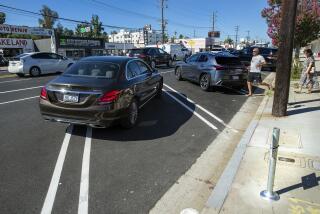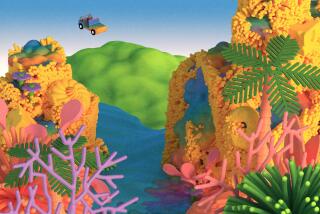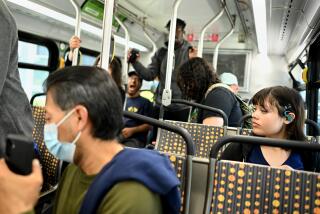In Germany, Auto-Free Enclave Hits Bump in Road
- Share via
FREIBURG, Germany — When French troops abandoned a riverside base here in 1994, ecology activists envisioned a solar-powered utopia sprouting where the war machine had been, with kids tumbling in leafy courtyards without risk of getting run over and bike stands supplanting driveways in blissful tribute to a life without cars.
But most of the starry-eyed initiators of the Vauban auto-free community have come to realize that life nowadays moves too fast to keep pace without occasional aid from the internal combustion engine.
In a land where environmental concern often crashes head-on with a love of fast cars and an absence of speed limits, a truly auto-free lifestyle is just the latest form of road kill.
In this Freiburg suburb, where Germany’s most advanced experiment in green living has been gradually scaled back to an “auto-reduced” community, idealism is being defeated by the demands of work, after-school activities, social life and shopping.
Half of the households in Vauban now have high-priced private parking spaces, and many of the other new homeowners in the sought-after enclave keep cars hidden in nearby lots or parked on adjacent public streets on the sly--much to the dismay of the project’s outnumbered initiators.
Because Vauban was developed in collaboration with city authorities and using federal aid for environmentally friendly projects, home buyers who pledged allegiance to auto-free living got priority for the bargain-priced building lots. Some promised to dispense with driving just to get into the neighborhood, while others simply underestimated their four-wheeled dependence.
Passel of Vehicles Despite Parking Curbs
“It’s heaven for the children but quite impractical for the adults,” Sabine Steffan, a partner in a car-sharing group, says as she watches her 2-year-old son, Federico, gamboling along a street that is little wider than most sidewalks and supposedly off limits for parking.
Off limits, that is, except for the construction workers’ trucks and delivery vans serving a neighborhood that got its first new inhabitants two years ago and will remain a massive building site until 2006.
Off limits except for the ubiquitous movers and installers settling in newcomers to the first 290 homes of a community that will eventually house 5,000 in a social strata-crossing mix of chic townhouses, student dormitories and apartments.
Off limits except for the requisite offloading of groceries, strollers and children before shuttling the car back to the solar garage at the commune’s entrance, nearly a mile away from some of the homes.
“What really stinks is when you have visitors--they have to pay to park in the garage on a 24-hour basis, and that can really run into money,” says Peter Kaltenbach, a trade school teacher who, like most Vauban residents, owns a car but cannot keep it at his doorstep.
Government investments in energy-efficient technologies and public transport brought down the price of property in Vauban to barely half that of other land so close to the city center, says Freiburg Mayor Matthias Schmelas.
Those who want a parking place with their homes--the first compromise retrofitted into the project, ostensibly to accommodate car-sharing--have to pay $17,000 on top of the subsidized land costs and the price of the house or apartment being built according to strict design limits.
Half of the homes are in condominium-like clusters with carports at ground level, while the rest have no driveways or parking along their narrow access roads. Those such as Kaltenbach who bought homes in the no-parking sector paid the $17,000 to use two lots on the settlement’s perimeter.
Parking is officially prohibited everywhere except in the private carports, the two owners-only lots and the solar garage, which costs about $24 a day. But amid the loading and fetching and ongoing construction, cars left illegally along the access roads often go unnoticed for hours or days.
“There are people who decide to save [the parking space fee] by saying they have no car, then parking it somewhere else. This is not what we want, and it is an annoyance for the other residents,” says Schmelas, a political conservative who inherited the Vauban project from leftist predecessors when he became mayor 18 months ago.
Suburb Intended to Reflect Green Values
Vauban is a classic case of experimental living, with the first 1,500 residents--a third of them students--working through the kinks of a unique urban development project designed, built and inhabited amid local and national political upheavals.
The residential enclave a mere 10-minute bike ride from the city center was intended to reflect the values and lifestyles of a region renowned for “green voting.” More than 25% of Freiburg’s 200,000 residents support the environmentalist Greens party now sharing power at the national level--although conservatives dominate the city government. In Vauban itself, 40% of the inhabitants are Greens.
Leftist leadership under Chancellor Gerhard Schroeder has given a boost to such experiments in ecological living in half a dozen communities across Germany, including projects now under construction in Muenster, Hamburg, Cologne and Munich that offer residents an array of options for getting around without personal cars. But as with Vauban, the more recently launched housing developments are finding more demand for auto-reduced living than for a lifestyle that is truly auto-free.
“These settlements are all too new to draw conclusions about their viability, but what we can see is that the concept of an auto-reduced neighborhood is an attractive new option on the housing market,” says Ulrike Reutter, deputy chief of transportation at the Institute for City and State Development in Dortmund. “As with child-friendly zones or housing with special access needs, there should be places for people who don’t have cars and want to feel the advantages of that, like less noise and being able to let kids play in the street.”
Experiment Faces Many Challenges
Vauban is the oldest German experiment in urban living without autos, and therefore the place that has encountered the most contradictions and challenges.
Named for a 17th century French general, Vauban was acquired by the city of Freiburg after Allied forces withdrew six years ago, no longer needed in the post-Cold War era in a Germany now reunited. Barracks were razed, land was cleaned and graded, and a team of city and community leaders concocted plans for an energy-efficient, nonpolluting, family-friendly complex.
“In the beginning, the enthusiasts who founded this project wanted a place that had no cars at all. But a couple of other places in Europe have already tried that, and the idea always falls apart,” says Fabian Sprenger, once among the self-styled alternativen who pushed for the old military base to become an auto-free zone. “Long-term, people just can’t get by without some access to a car.”
Sprenger concedes that the evolution of the project from “ecotopia” to what is now simply a few roads less traveled has left some bad feelings, especially among idealistic originators who have staked out their own space in the heart of Vauban.
A dozen railroad cars, buses, minivans and even a hearse have been converted into homes and circled in an encampment known as SUSI, the German acronym for Self-Sufficient Independent Settlement Initiative. In a moral protest against the majority’s defection from the project’s initial ideals, SUSI’s few residents are now squatters among what they see as fair-weather friends of nature.
For the majority of Vauban residents, however, the compromises detract little from the greater goal of minimized driving.
“I still like the idea of auto-free living,” insists Jeanne von Seld, a 22-year-old student with a 28-year-old Volkswagen she has to leave on the community’s outskirts. “There are good bus connections and I love to ride my bike, but my parents live an hour from here and I need the car to go see them.”
Location, Low Prices Cited for Big Demand
Roland Veith, the project’s city liaison since its inception six years ago, acknowledges that Vauban’s prized location and bargain pricing are probably bigger reasons for the overabundance of would-be buyers than the concept of auto-free living.
Project developers received three times as many applications for the fixed-price building lots than they could satisfy, and a home in Vauban has become only more attractive as restrictions on vehicle use have been scaled down.
“It’s been my experience that no project ever goes as expected,” says Veith, a career urban planner. “The fundamentals here are correct, but you have to see how it develops and make adjustments.”







